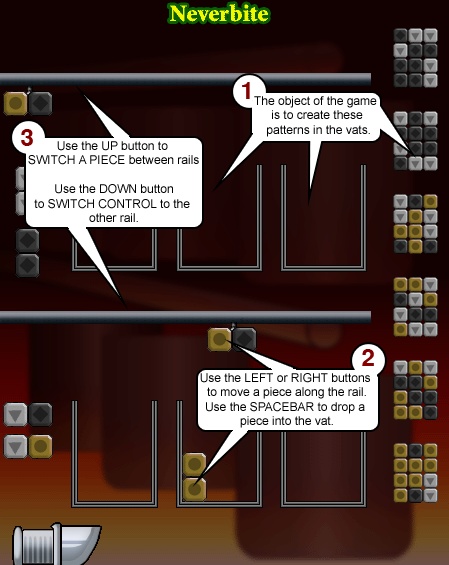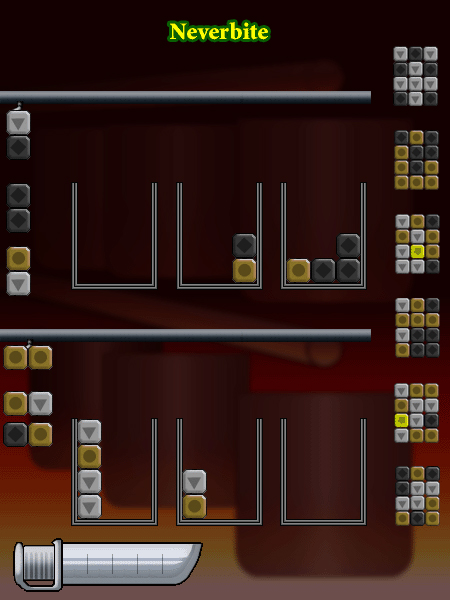GCPP:Proposal-Neverbite
Puzzle Codename: Neverbite
| Contact | |
| Username: | jdnx429 |
| Additional contact info: | danramarch@gmail.com |
| Project forum thread: | Discussion |
Game concept
A pattern-matching block-dropping game!
Objective
Drop blocks into various vats to match the patterns given on the board.
Gameplay
On the side of the board there are six patterns. Your goal is to match those patterns by dropping blocks.
Quickstart
Start Game
At the beginning of the game, all vats will be empty and the six patterns will be shown on the side. Two of those patterns will be lower scoring, two color patterns. The remaining four patterns will be three color full score patterns.
A piece will appear on each of the rails - one horizontal and one vertical. Slide the hook over the vat and drop the piece in the desired location. See image below. The next two pieces are shown on the left side of the rail.
Controls
The only controls are for the hook and the rails. The hook controls the block and you can only move it left or right. However, you can either move the top hook or the bottom hook. In addition, you can switch the rails. In this manner, you can pick any of the six vats to drop a block.
Dropping Blocks
Once the pieces have been dropped, they will fall as separate entities (as in Swordfighting) and not as a combined piece (as in Sailing). Horizontal blocks, thus, can drop to different levels.
When a block is dropped, it is replaced by another block. This will depend on the rail - vertical blocks will appear on the top rail, while horizontal blocks will appear on the lower rail. Thus, it is possible to have two vertical blocks at the same time. This is accomplished by switching rails so that the horizontal block is on the top rail and dropping into the vat. A new vertical block will appear on the top rail while a vertical block remains on the lower rail from the previous switch.
The player also has the option of 'dumping' a piece for a small penalty.
Forging
When a vat is filled with 12 pieces, it is "forged" and the blocks are cleared from it. The best matched pattern from the side board also disappears. Internally, the program checks the vat pattern against each of the patterns on the side. If it finds a perfect match - it will display "Masterpiece" (or something similar). If it finds a good match (11 out of 12 blocks matched) then it will display "Craftsmanship". A lower number of matched pieces results in lower scores.
However, if a forged vat does not match any of the patterns with at least six pieces, then it is "melted" and recycled with no penalty to the player. This is similar to Distillery where pieces can be dumped in a burn. However, recycling a vat will be much more difficult and careful observation will be needed to avoid accidentally matching a pattern with more than 6 pieces.
Once a vat has been forged and a pattern is matched, a new one appears.
Pieces
There are three basic pieces - Iron(Silver), Copper (Brown) and Carbon (Black).
If a block is left on the rails too long, it will turn cold (shown by a bluish tint). The block can be dropped into a vat but will not count as matching any pieces. The length of time will be about 30 seconds.
There also two bonus pieces:
Gold - It is rare and patterns with gold are much higher scoring than those with the three basic elements. (See Programming Notes for Probabilities)
Bombs - A little less rare than gold. When dropped, they will automatically clear a vat with no penalty to the player. (See Programming Notes for Probabilities)
Time Limits
If a piece stays too long on a rail, it will turn blue as shown below. At 15 seconds, the piece will turn somewhat blue and a sound will ring. If the piece is dropped into a vat at this point it will return to its normal color. At 20 seconds the piece will turn completely blue. It can still be dropped into vats but it will not count towards matching any pieces. Thus a vat can be recycled just by dumping into it 3 cold pieces. However there would be a penalty in time and points.
Indicator
The sword at the bottom of the screen is an indicator of how well you are doing. A perfectly looking sword, as shown in the image in the Images section, results from a very high score. A low score results in an badly shapen and ugly sword. The length of the sword only indicates how many patterns have been matched. 'This is similar to the flag in Shipwrightery or the level of the Rum in Distilling
Scoring
Scoring is based on how well you match any of the given patterns. Matching a pattern exactly will result in a perfect score for that pattern. Matching only 7 or 8 blocks of any pattern will result a low score. Building above the level of the vat will booch that vat.
Proposed figures below are preliminary and are subject to change after testing.
2 Color Patterns
7 pieces - 5 points
8 pieces - 10 points
9 pieces - 20 points
10 pieces - 30 points
11 pieces - 40 points
12 pieces - 60 points
3 Color Patterns
7 pieces - 10 points
8 pieces - 20 points
9 pieces - 40 points
10 pieces - 60 points
11 pieces - 80 points
12 pieces - 120 points
Cold Pieces
Allowing a piece turn cold = -15 points
Gold Pieces
Extra bonus points for
7 piece match = +10
8 piece match = +15
9 piece match = +20
10 piece match = +30
11 piece match = +40
12 piece match = +50
Booching
Booching a vat = -20 points
Dumping
Dumping a piece = -5 points
Dumpbing a bomb = no penalty
Variability
As the game progresses, gold and bombs will appear. (More to added)
End criteria
Forge 12 patterns.
Difficulty scaling
At the lower levels, there will only be two colors to work with. Once a player rises to a determined standing, the third color becomes available to play. At the higher levels, all 6 patterns should be matched before replacement patterns appear.
Crafting type
Blacksmithing. However, I think the puzzle can easily be modified to Tailoring or Furnishing. It just depends on what the patterns represent.
Known problems
Notes
Programming Notes
Controls
Mouse - Move blocks along rails Left click - Drop block into vat Right click - Dump block, with score penalty. Space Bar - Switch Rails I imagine that animation for switching rails will occur by having both rails and pieces scroll all the way out of the
Piece Probabilities
There are six normal pieces and each should have an equal probability of occurring - (c-c, c-s, c-i, s-s, s-i, i-i). In addition, no piece should repeat itself. This is to increase the variability of the pieces on the board.
Gold
The default probability for a Gold Piece is 0.00. Only 10, 11 or 12 piece matches increase that probability.
10 piece match = +0.10 (10%)
11 piece match = +0.25 (25%)
12 piece match = +0.50 (50%)
This probability is per pattern and resets to 0.00 after a gold piece appears. After it is determined that a gold piece will appear, the program should create a random 3-color pattern and then replace any of those pieces with a gold piece.
Once a pattern with a gold piece appears, the program should check adjacent pieces to the gold and create a new block with that piece. (See below for example.) This gold patterned piece should appear in 6-12 pieces (randomly determined) and will only appear once.
Gold Piece Example
If the pattern is this:
Then the program should check the adjacent pieces for possible patterns:
Thus, any of these pieces would be scheduled to appear in the piece queue
Bombs
The default probability for a Bomb Piece is 0.00. The probabilty of a bomb appearing the piece queue is increased by the number of pieces dropped and number of pieces matched in a pattern.
Probablity increase per piece dropped = +0.005 (0.5%)
7 piece match = +0.05 (5%)
8 piece match = +0.10 (10%)
9 piece match = +0.15 (15%)
10 piece match = +0.20 (20%)
11 piece match = +0.25 (25%)
12 piece match = +0.30 (30%)
The probability resets to 0.00 once a bomb has appeared on the board.
Other Notes
- From a few excel mock-ups I have done, it will be somewhat difficult to create a Masterpiece - only 1 or 2 per session.
Images




